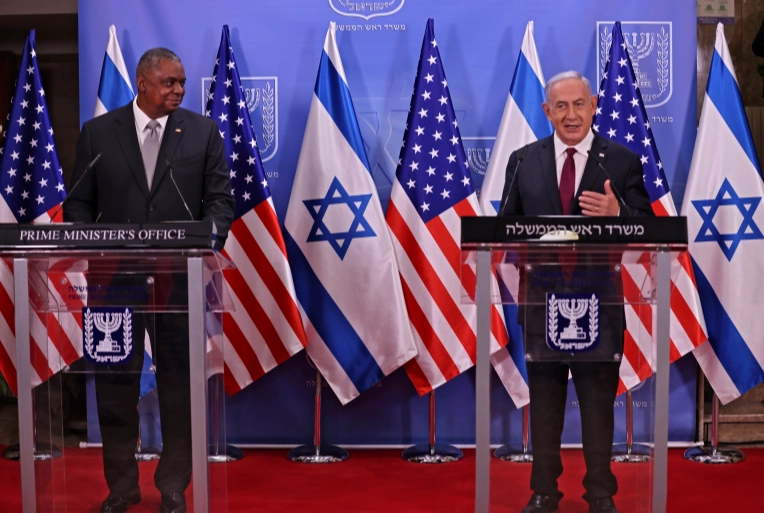
US Defense Secretary Lloyd Austin and Israeli Prime Minister Benjamin Netanyahu gave statements after their meeting in Jerusalem [File: Menahem Kahana/The Associated Press]
Jerusalem, April 13 (RHC)-- Israeli Prime Minister Benjamin Netanyahu has called Iranian authorities a “fanatical regime” at a joint news conference with U.S. Secretary of Defense Lloyd Austin in Jerusalem.
The U.S. official’s arrival in Israel coincided with a sabotage attack on Iran’s underground Natanz nuclear facility that damaged its centrifuges, an assault that could imperil continuing talks over rejoining the 2015 Iran nuclear accord. Returning Iran to the deal has been a top priority of the administration of US President Joe Biden.
Netanyahu did not respond to Iranian allegations that Israel was behind the attack on Sunday. However, Israeli media widely reported that the country had orchestrated the devastating cyberattack that caused a blackout at the nuclear facility.
Instead, the prime minister said: “My policy as prime minister of Israel is clear: I will never allow Iran to obtain the nuclear capability to carry out its genocidal goal of eliminating Israel.” Austin, for his part, said he was “grateful for today’s discussion to advance shared defence priorities and maintain close cooperation between the United States and Israel”.
At an earlier news conference at Israel’s Nevatim airbase on Monday, Austin declined to say whether the Natanz attack could impede the Biden administration’s efforts to bring Iran back into compliance with the 2015 nuclear deal, from which US President Donald Trump withdrew in 2018.
The Natanz attack came just days after the first signs of progress since Biden took office, with parties to the agreement meeting in Vienna last week. The U.S. has said Iran must cease violating the accord by enriching and stockpiling uranium beyond the limits set out in the agreement. Iran has said the US must first lift sanctions before it would return to compliance.
While the talks saw no breakthroughs, or face-to-face meetings between Iranian and US officials, they were widely viewed as a hopeful first step. In particular, the US said it was ready to remove sanctions “inconsistent” with the deal. Israel opposed the initial nuclear deal and has opposed efforts to revive it.
During his first trip to Israel as secretary of defence, Austin also met with his Israeli counterpart Benny Gantz, telling reporters on Sunday the duo discussed Israeli defence capabilities, regional security challenges, and “U.S. support for efforts to normalise relations between Israel and Arab and Muslim majority nations”.
The Biden administration has said it plans to build on normalisation agreements reached during the Trump administration between Israel, Bahrain, Morocco, the UAE and Sudan, pending reviews. The administration has said it will be less permissive towards Israel than former President Donald Trump, but has been criticised for maintaining, at least in the short term, many of Trump’s controversial policies.
While restoring aid to Palestinians, including plans to resume funding to the United Nations agency that supports Palestinian refugees (UNRWA), Biden has resolved not to reverse Trump’s recognition of Jerusalem as Israel’s capital and move the US embassy back to Tel Aviv.
Among other sticking points, the administration has not made it clear when it plans to reopen the Palestinian mission in Washington, which was shuttered under Trump, and has not reversed the Trump administration’s recognition of Israeli sovereignty over the Syrian-claimed Golan Heights.
Biden has also been criticised for not yet naming a special envoy for the Palestinian-Israeli conflict, with some suggesting the omission indicates a resolution is not a top priority for his administration.

